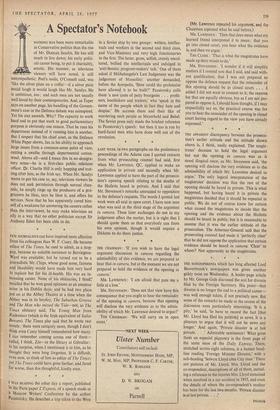THE APPARENT discrepancy between the prosecu- tion's earlier attitude and
the attitude shown above is, I think, easily explained. The magis- trates' decision to hold the legal argument but not the opening in camera was as it stood illogical since, as Mr. Stevenson said, 'the opening will disclose the very evidence as to the admissibility of which Mr. Lawrence desired to argue.' The only logical interpretation of the magistrates' decision was that the rest of the opening should be heard in private. This is what happened, but having heard it in private the magistrates decided that it should be repeated in public. We do not of course know for certain what caused the magistrates to decide that the opening and the evidence about the Hulletts should be heard in public, but it is reasonable to assume that it was the earlier attitude of the prosecution. The Attorney-General said that the prosecuting counsel had made it 'perfectly clear' that he did not oppose the application that certain evidence should be heard in camera. 'Clear' to whom? Not apparently to the magistrates.






























 Previous page
Previous page